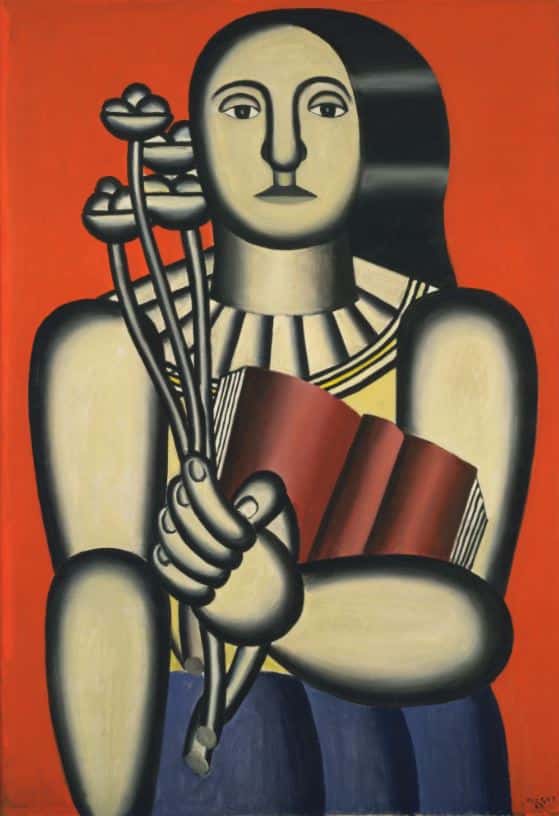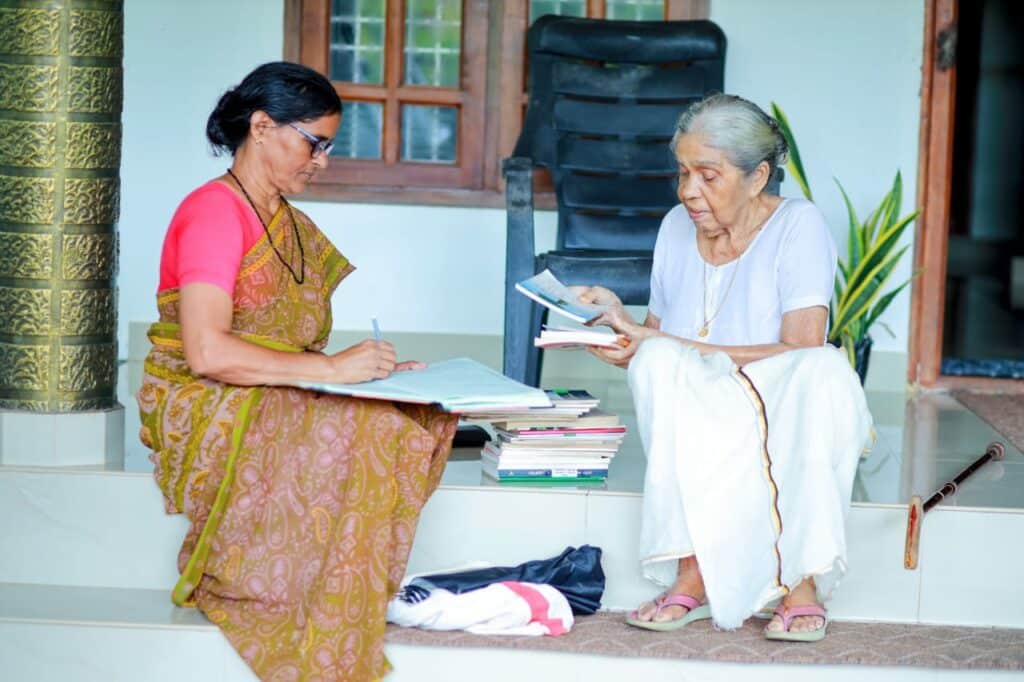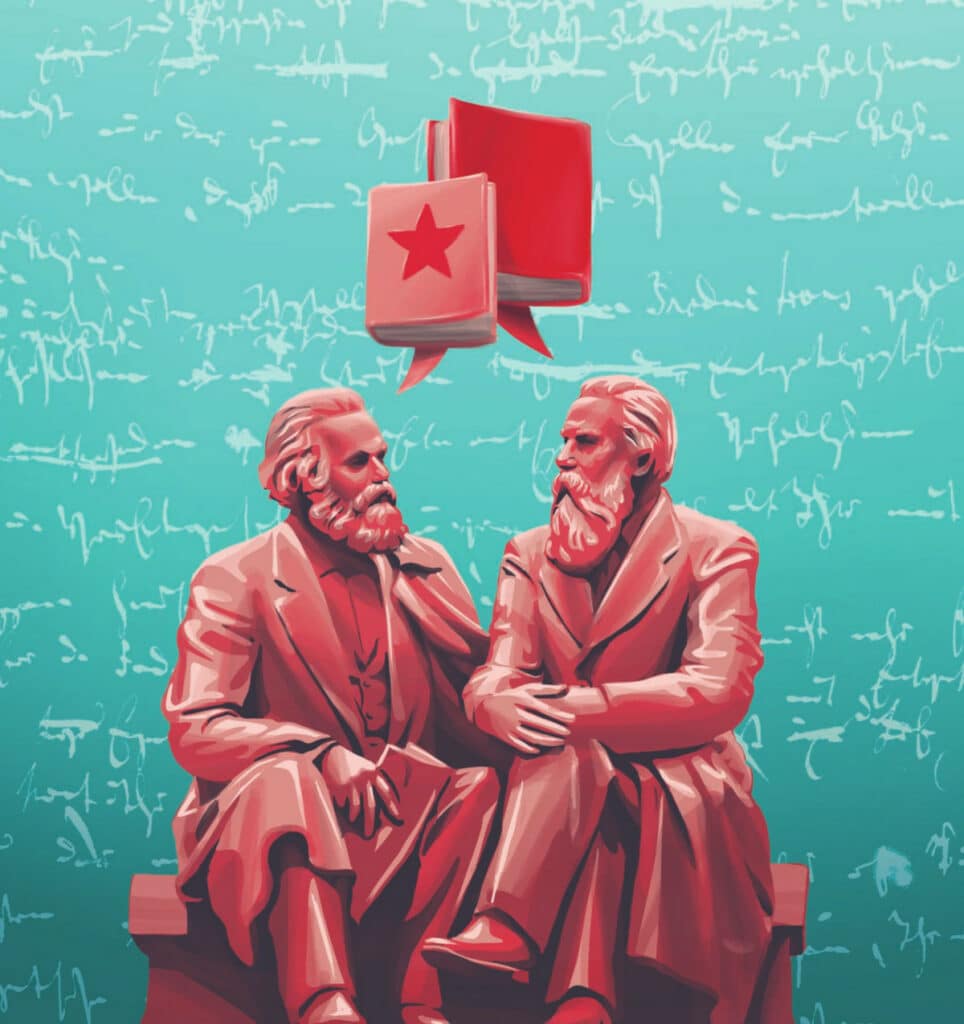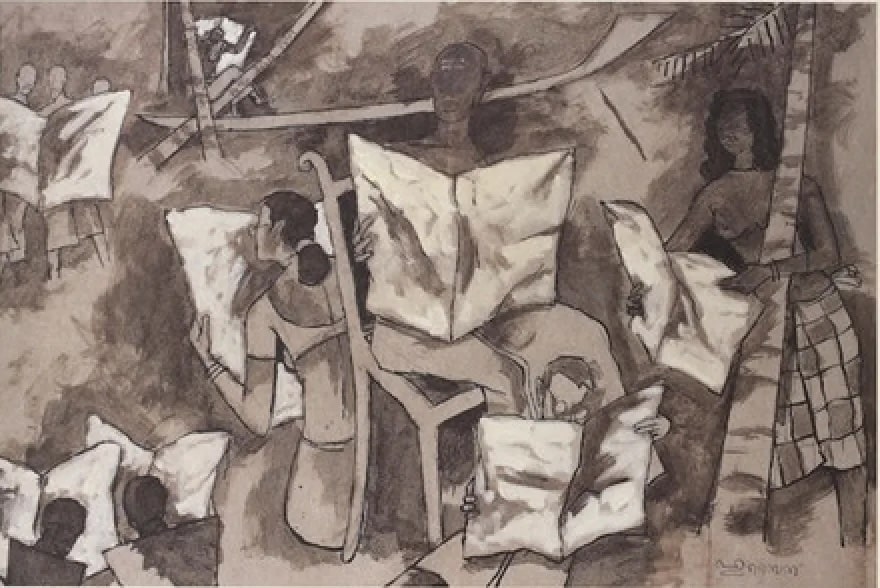Dear friends,
Greetings from the desk of Tricontinental: Institute for Social Research.
There are days when the dusk of events settles heavily on me, and I try to find a way to retreat into a quiet corner and throw myself into the world of a book. It does not matter if it is a novel or a history book, as long as the author is able to conjure up a world that transports me from the flood of brutalities to an island of imagination. In recent months, I have been reading more and more novels—including Japanese crime fiction, a notable favourite—and finding in them characters with whom I can sometimes laugh and sometimes frown in bewilderment. Madness is not new to our world. It has been there before.
I have before me Seichō Matsumoto’s Ten to Sen (Points and Lines, 1958) and Suna no Utsuwa (Inspector Imanishi Investigates, 1960—1961) as well as Tetsuya Ayukawa’s Kuroi Hakucho (The Black Swan Mystery, 1961), all detective novels that were written in the aftermath of the US’s horrendous use of atom bombs on Hiroshima and Nagasaki in 1945. These books, and the films of the same period—especially Gojira (Godzilla), which was directed and co-written by Ishirō Honda in 1954—irradiate the complexities of a post-atomic society. I can imagine these writers in their war-ravaged towns with their pens and scarce paper trying to place a mirror before their society, their detectives serious working-class men who must confront the audacity of ancient families that were once deeply entrenched in the old fascist social order and have now reinvented themselves as dynamic capitalists. These writers, however, came well after the first words had been uttered from within Hiroshima itself from poets such as Sankichi Tōge (1917—1953) and Sadako Kurihara (1913—2005), both victims of the atom bomb who wrote as the radiation still lingered over their homes. In December 1945, Kurihara wrote a gentle, calm poem called ‘The Children’s Voices’:
On a warm winter afternoon
I was tending the vegetable garden.
Absorbed in foolish thoughts, I’d neglected it
for some time,
and with all the sun we’ve had this year,
before I knew it, there were weeds.
Normally I tended the garden so religiously, dawn and dusk,
but I’d been too restless and stopped.
Why? I pulled up weeds as I pondered.
‘Mommy!’ The children were calling, out of breath.
They were home from school.
Ah, how innocent and pure their voices!
From now on, Mommy won’t be so silly
as to let weeds grow in our garden.
Our garden won’t have a single weed.

In 1949, the German Marxist Theodor Adorno wrote in an essay on cultural criticism, ‘To write poetry after Auschwitz is barbaric’. Obviously, Adorno did not mean that any poetry written after the Holocaust is barbaric, since his close friend Bertolt Brecht wrote some beautiful verse in the post-war years. What Adorno seemed to imply was that the culture industry absorbed all that was good in the world and made it into commodities. Art struggled with its inherent capacity to be illuminating and was being dragged into becoming just another commercial object. But Adorno’s pessimism was unwarranted. Kurihara’s poems, for instance, despite being censored by the U.S. occupation, have nonetheless become a constant refrain at commemorations for Hiroshima and Nagasaki, and they eventually entered the curricula for school children in Japan and other parts of the world. The artistic sensibility, eager to make the world a better place, continues to try and build communities across the world rather than just commodities to sell.
In our latest dossier, The Joy of Reading, we celebrate this sensibility: we want reading to help us build communities of joy. The text champions the importance of literacy for a democratic culture, but this literacy is not merely teaching people to write their name in their own language; it is to afford everyone the right to access a public library and to continue to expand their imagination throughout their lives. In the dossier, we highlight examples of popular literacy campaigns in Mexico, China, and the Indian state of Kerala. In each of these cases, the imperative of reading came from anti-colonial movements, which put on the agenda not only freedom from colonialism but also the clarity of building a society with high levels of political and cultural education so that people could participate in social debates and not be mere spectators of an elite.

Fernand Léger (France), Woman with a Book, 1923.
When we asked the Mexican writer Paloma Saiz Tejero of the Brigade to Read in Freedom (Brigada para Leer en Libertad) about the importance of reading, she told us:
A people who read are a people who build critical thinking; they are promoters of utopias. A people who know their history and take ownership of it will feel proud of their roots. Reading socialises; it shares experiences and information. Books allow us to understand the reason that constitutes us and our history; they make our consciousness grow beyond the space and time that founds our past and present. Reading generates better citizens. Thanks to books, we learn to believe in the impossible, to distrust the obvious, to demand our rights as citizens, and to fulfil our duties. Reading influences the personal and social development of individuals; without it, no society can progress.
What the Brigada para Leer en Libertad does in Mexico is not so different from the public library movements in China and India. The Indian Library Congress, an initiative of the Indian communist movement, was first held in January 2023 and has now become an annual event. Part of its work is to ensure, as the congress pledged, that ‘libraries must become an important and active public space for the community as well as incubators for cultural development and hubs for the organisation of and/or venues for activities such as movie screenings, sports, art fairs, festivals, and vocational training classes. Health centres and science classes must be established next to these libraries’. Likewise, in both rural and urban parts of China, public libraries anchor cultural life and provide a space for popular education.

Radha V. P. in her village in Vellur, Kannur, Kerala, with her bag of books from the Jawahar Library.
In these countries, the establishment of these public libraries was not a top-down initiative. It came from the work of ordinary people. The cases presented in the section on Kerala are exemplary, such as sixty-year-old Radha V. P., a beedi (a type of hand-rolled cigarette) worker who came to her passion for education by reading the Communist Party of India (Marxist)’s weekly magazine in her limited free time and then joined a local library’s mobile unit. She would carry books in her satchel to community members’ homes, particularly women and the elderly, so that they could borrow them and then return them to her. ‘I never felt the bag was heavy’, she said, ‘as the scent of the books always gave me immense happiness’.

The dossier closes with a section on Red Books Day, celebrated each year on 21 February to commemorate the anniversary of The Communist Manifesto’s publication as well as International Mother Language Day. An initiative of the Indian Society of Left Publishers and then of the International Union of Left Publishers (IULP), Red Books Day began in 2020 to encourage people to hold festivals and public readings of their favourite red books. The day has expanded to the point that last year over a million people participated across the world, from Indonesia to Cuba. The art in the dossier comes from the Red Books Day 2025 Calendar, which can be downloaded in its English format and purchased around the world from members of the IULP, from Marjin Kiri (Indonesia) to Inkani Books (South Africa) to La Trocha (Chile).
Red Books Day is an initiative to enhance the public joy of reading and to rescue collective life. We anticipate that, in a few years, millions of people around the world will join together in public places to celebrate Red Books Day, from floats in Brazil’s Carnival with a giant red book on a flatbed truck to members of a public library in Kerala who carry more and more chairs onto the streets and read to each other while a musician bangs an idakka (a type of wooden drum).

M. F. Husain (India), 100% Literacy (Folklore Kerala Series), 2010.
As part of this attempt to promote a joy of reading and rescue collective life, our institute is encouraging our readers to create Tricontinental reading circles. Gather friends and colleagues to form a reading group in your area and meet once a month to discuss our dossiers or other publications. There is nothing more enriching than the process of collective reading and discussion. If you set up a Tricontinental reading circle, please let us know by writing to [email protected].
Warmly,
Vijay

